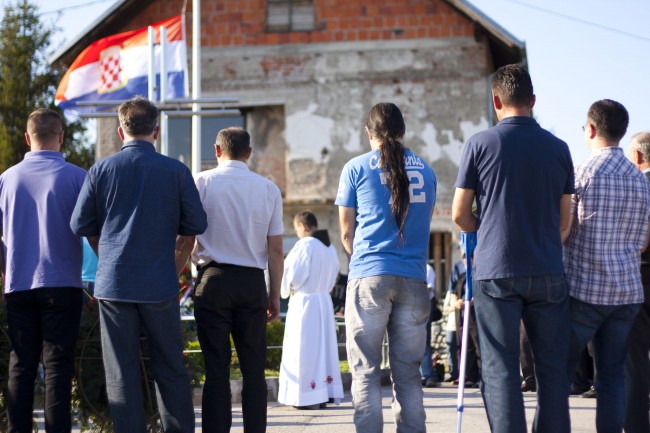We were invited to attend commemorations in the settlements of Laništa and Ulice near Brčko on 8 May by the Association of Families of Croat Defenders killed and missing in the Homeland War of Ravne-Brčko.
On this date in 1992, members of the Army of RS killed 32 people, civilians and soldiers, from the Brčko area villages of Ulice, Laništa, Marković Polje, Donji Vukšić, Gornji Vukšić, Krepšić and Donji Rahić.

Our group made up of veterans of VRS from Šamac and Derventa, HV from Nuštar, ARBiH from Zavidovići and Vitez, and CNA activists from Belgrade and Sarajevo were joined on the day of the commemoration by members of HVIDR[1] of Ravne-Brčko and the RVI ARBiH Organisation from Brčko. There were fifteen of us in all.
Upon our arrival in Laništa, the official commemoration started in front of the memorial. The gathering was addressed by the president of the Families Association, Stjepan Marčetić. In his speech, he mentioned that the commemoration was being attended by veterans from all the armies that participated in the war. He thanked us for coming to honour the victims and emphasised that the presence of soldiers who had been on opposite sides in the war sends a message of hope for peaceful coexistence between all peoples living in this region.

After the service for the dead, wreaths were laid and candles were lit. The priest, fra Ante Tomas also stressed that peace and fostering good neighbourly relations were a universal value for all people, be they believers or not, and irrespective of their nationality. He addressed our joint group of veterans saying that they had stood by their people during the war and should not feel guilty for having been soldiers, adding that everyone caries individual responsibility for their conduct and their actions. He thanked them for coming to honour the victims in the interest of a better future for all the peoples of the region.
After Laništa, we went to Ulice. A mass for the dead was held in the yard of the chapel, and the prayer by Franciscan monks connected the desire for peace among people with solidarity that makes us better persons and forgiveness that makes all this easier.
A service for the victims was then held in front of the memorial and wreaths were laid. The gathering was addressed by Mira Breškić, a member of the Families Association, who described the events in that area from 23 years ago and called for those responsible for the crime to finally be brought to face justice. She pointed out that keeping the memory of those killed was a duty and responsibility of their community, of current and future generations, adding that building peace was also their responsibility. And in order to fulfil it, we must respect each other.

We remained in Ulice a while longer. People came up to meet us and ask about our work. There can be no greater encouragement and incentive for further peace actions than that of people from local communities with deep wounds from the war understanding what you are doing and encouraging you to continue.
In Brčko, we held a group meeting to share impressions.
Given our past experience with commemorations where they are often used as places for political speeches in which evil is still made into a cliché and where the nation is called upon to unite because ‘enemies are still enemies and prepared to do it all over again’, this time, we were surprised by how everything went.
The way the priests addressed the gathering may have contributed to everything transpiring in a tranquil tone with a different energy from what usually accompanies events such as this one. Also, the way the local community responded to us was spontaneous and natural, we felt welcome.
We agreed that we had grown stronger as a group maintaining a high level of mutual trust and that people accept us as such. One of the ideas was that as such we also affect the events we visit and that organisers of commemorations eliminate content with strong nationalist rhetoric from the programme when faced with the presence of ‘others’.

One of the participants said that in ten years or so, all our commemorations would look like this, and the rest of us said we certainly hoped so.
We thanked our partners from the Families Association and HVIDR of Ravne-Brčko for taking on the responsibility of inviting us to this event and for being of great help during the organisation of our arrival and stay. Our relationship is a confirmation of mutual trust and respect that we have been fostering and improving for years.
Commemorations to those killed in the war bring back memories of all the suffering war imposes. Meeting the families and friends of the victims at the memorial sites touches your heart and transfers the pain and grief that are then no longer only theirs to bear. It is difficult, but it is part of our present day lives.
The best way to pay our respects to those killed in the war is to build peace.
[1] Croat disabled veterans from the Homeland War